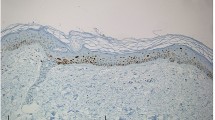Abstract
Background
Enhancer of Zeste Homolog 2 (EZH2) is a polycomb group protein that has been shown to be involved in the progression of multiple human cancers including melanoma. The expression of EZH2 in normal skin and in pre-malignant and malignant cutaneous squamous cell carcinoma (SCC) has not been studied.
Objectives
We examined the expression of EZH2 in normal skin, actinic keratosis (AK), SCC in situ, well-differentiated (SCC-WD), moderately-differentiated (SCC-MD) and poorly-differentiated SCC (SCC-PD) to ascertain whether EZH2 expression differentiates these conditions.
Materials and Methods
Immunohistochemical staining for EZH2 was performed on formalin-fixed paraffin-embedded biopsies and a tissue microarray containing normal skin, AK, SCC in situ, and SCC of different grades.
Results
In comparison to the normal skin, EZH2 expression in actinic keratosiswas increased (p = 0.03). Similarly, EZH2 expression in all of the neoplastic conditions studied (SCC in situ, SCC-WD, SCC-MD and SCC-PD) was greatly increased in comparison to both the normal skin and actinic keratosis (p≤0.001).
Conclusion
EZH2 expression increases incrementally from normal skin to AK and further to SCC, suggesting a role for EZH2 in the progression and differentiation of SCC. EZH2 expression may be used as a diagnostic marker for differentiating SCC from AK or normal skin.
Similar content being viewed by others
References
Chase A, Cross NC. Aberrations of EZH2 in cancer. Clin Cancer Res 2011; 17: 2613–2618.
Simon JA, Lange CA. Roles of the EZH2 histone methyltransferase in cancer epigenetics. Mutat Res 2008; 647: 21–29.
Tonini T, D’Andrilli G, Fucito A, Gaspa L, Bagella L. Importance of Ezh2 polycomb protein in tumorigenesis process interfering with the pathway of growth suppressive key elements. J Cell Physiol 2008; 214: 295–300.
Arisan S, Buyuktuncer ED, Palavan-Unsal N, Caskurlu T, Cakir OO, Ergenekon E. Increased expression of EZH2, a polycomb group protein, in bladder carcinoma. Urol Int 2005; 75: 252–257.
Bachmann IM, Halvorsen OJ, Collett K, et al. EZH2 expression is associated with high proliferation rate and aggressive tumor subgroups in cutaneous melanoma and cancers of the endometrium, prostate, and breast. J Clin Oncol 2006; 24: 268–273.
Breuer RH, Snijders PJ, Smit EF, et al. Increased expression of the EZH2 polycomb group gene in BMI-1-positive neoplastic cells during bronchial carcinogenesis. Neoplasia 2004; 6: 736–743.
Ciarapica R, Miele L, Giordano A, Locatelli F, Rota R. Enhancer of zeste homolog 2 (EZH2) in pediatric soft tissue sarcomas: first implications. BMC Med 2011; 9: 63.
Kleer CG, Cao Q, Varambally S, et al. EZH2 is a marker of aggressive breast cancer and promotes neoplastic transformation of breast epithelial cells. Proc Natl Acad Sci U.S.A. 2003; 100: 11606–11611.
McHugh JB, Fullen DR, Ma L, Kleer CG, Su LD. Expression of polycomb group protein EZH2 in nevi and melanoma. J Cutan Pathol 2007; 34: 597–600.
Raaphorst FM, van Kemenade FJ, Blokzijl T, et al. Coexpression of BMI-1 and EZH2 polycomb group genes in Reed-Sternberg cells of Hodgkin’s disease. Am J Pathol 2000; 157: 709–715.
Sudo T, Utsunomiya T, Mimori K, et al. Clinicopathological significance of EZH2 mRNA expression in patients with hepatocellular carcinoma. Br J Cancer 2005; 92: 1754–1758.
Kidani K, Osaki M, Tamura T, et al. High expression of EZH2 is associated with tumor proliferation and prognosis in human oral squamous cell carcinomas. Oral Oncol 2009; 45: 39–46.
Yamada A, Fujii S, Daiko H, Nishimura M, Chiba T, Ochiai A. Aberrant expression of EZH2 is associated with a poor outcome and P53 alteration in squamous cell carcinoma of the esophagus. Int J Oncol 2011; 38: 345–353.
Balasubramanian S, Adhikary G, Eckert RL. The Bmi-1 polycomb protein antagonizes the (-)-epigallocatechin-3-gallate-dependent suppression of skin cancer cell survival. Carcinogenesis 2010; 31: 496–503.
Crea F, Fornaro L, Bocci G, Sun LF. EZH2 inhibition targeting the crossroad of tumor invasion and angiogenesis. Cancer Metastasis Rev 2012; 31: 753–761.
Athanassiadou AM, Lazaris AC, Patsouris E, Tsipis A, Chelidonis G, Aroni K. Significance of cyclooxygenase 2, EZH-2 polycomb group and p53 expression in actinic keratosis and squamous cell carcinomas of the skin. Am J Dermatopathol 2013; 35: 425–431.
Hu YC, Lam KY, Law S, Wong J, Srivastava G. Profiling of differentially expressed cancer-related genes in esophageal squamous cell carcinoma (ESCC) using human cancer cDNA arrays: Overexpression of oncogene MET correlates with tumor differentiation in ESCC. Clin Cancer Res 2001; 7: 3519–3525.
Kidani K, Osaki M, Tamura T, et al. High expression of EZH2 is associated with tumor proliferation and prognosis in human oral squamous cell carcinomas. Oral Oncol 2009; 45: 39–46.
Author information
Authors and Affiliations
Corresponding author
About this article
Cite this article
Xie, Q., Wang, H., Heilman, E.R. et al. Increased expression of enhancer of Zeste Homolog 2 (EZH2) differentiates squamous cell carcinoma from normal skin and actinic keratosis. Eur J Dermatol 24, 41–45 (2014). https://doi.org/10.1684/ejd.2013.2219
Accepted:
Published:
Issue Date:
DOI: https://doi.org/10.1684/ejd.2013.2219




